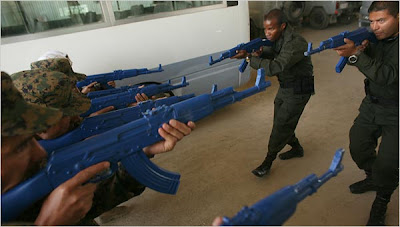A report on Darfur by the United Nations Environment Program (UNEP) is getting a good deal of press currently:
'The conflict in Darfur has been driven by climate change and environmental degradation, which threaten to trigger a succession of new wars across Africa unless more is done to contain the damage, said a UN report published on Friday.
"Darfur ... holds grim lessons for other countries at risk," an 18-month study of Sudan by the UN Environment Program (UNEP) concluded.'
The links between natural resources and conflict have been well-studied over the last years, so the UNEP report is not ground-breaking. That said, it is good to see analysis on Darfur that goes beyond the travails of deploying a more robust peacekeping force. The report's statistics give some stark indications of the projected impacts of global warming:
'It [the report] found that the desert in northern Sudan has advanced southward by 80km over the past 40 years and that rainfall has dropped 16 percent to 30 percent. Climate models for the region suggest a rise of between 0.5oC and 1.5oC between 2030 and 2060. Meanwhile, yields in the local staple, sorghum, could drop 70 percent.'
Showing posts with label Economic Foundations for Growth and Development. Show all posts
Showing posts with label Economic Foundations for Growth and Development. Show all posts
Sunday, 24 June 2007
Friday, 22 June 2007
Looking at early ideas for the Iraq Surge: Bush $1bn jobs plan to draw Iraqis into fold
The battle to win the war in Iraq will apparently be not only include a surge of 20-30,000 US troops, but will include an absolutely massive hearts-and-minds employment-creation campaign:
"The other sweetener will be a doubling of reconstruction efforts. Up to $1bn is to be spent on a programme in which Iraqis are employed to clean the streets and repair and paint schools.
The Pentagon-run scheme would try to draw young men away from insurgent groups and back into the mainstream economy. It would be administered by officials embedded in US combat brigades in a bid to persuade Iraqis that the Americans were there as a force for good and not just of occupation."
The 'embedding' issue will clearly be one for humanitarian organizations to fume about; more importantly, even the least-experienced development worker would ask about the sustainability of spending 1 billion US dollars on ad hoc employment generation projects.
"The other sweetener will be a doubling of reconstruction efforts. Up to $1bn is to be spent on a programme in which Iraqis are employed to clean the streets and repair and paint schools.
The Pentagon-run scheme would try to draw young men away from insurgent groups and back into the mainstream economy. It would be administered by officials embedded in US combat brigades in a bid to persuade Iraqis that the Americans were there as a force for good and not just of occupation."
The 'embedding' issue will clearly be one for humanitarian organizations to fume about; more importantly, even the least-experienced development worker would ask about the sustainability of spending 1 billion US dollars on ad hoc employment generation projects.
Labels:
Civil Society,
Economic Foundations for Growth and Development,
Economic Strategy and Coordination of International Assistance,
Employment Generation,
Local Governance,
Public Administration and Government Strengthening,
Security and Public Order,
Social and Economic Well-Being and Humanitarian Relief
Poppy Fields Are Now a Front Line in Afghanistan War - NYT
NYT has an excellent article on the new front line in Afghanistan- the drug war.

The article doesn't shy away from the evident criticism- that having avoided fighting the opium trade in Afghanistan has seriously eroded the military, political and development progress made elsewhere. The issue of exactly 'who?' should take on the drug war has been a political- and military- hot potato since the 2001 war. At alternating intervals, ISAF, Coalition Forces and the Afghan government have denied their role in the drug war, and often even its importance.
One interlocutor made an interesting parallel with Iraq:
“This is the Afghan equivalent of failing to deal with looting in Baghdad,” said Andre D. Hollis, a former deputy assistant secretary of defense for counternarcotics. “If you are not dealing with those who are threatened by security and who undermine security, namely drug traffickers, all your other grandiose plans will come to naught.”<

The article doesn't shy away from the evident criticism- that having avoided fighting the opium trade in Afghanistan has seriously eroded the military, political and development progress made elsewhere. The issue of exactly 'who?' should take on the drug war has been a political- and military- hot potato since the 2001 war. At alternating intervals, ISAF, Coalition Forces and the Afghan government have denied their role in the drug war, and often even its importance.
One interlocutor made an interesting parallel with Iraq:
“This is the Afghan equivalent of failing to deal with looting in Baghdad,” said Andre D. Hollis, a former deputy assistant secretary of defense for counternarcotics. “If you are not dealing with those who are threatened by security and who undermine security, namely drug traffickers, all your other grandiose plans will come to naught.”<
Subscribe to:
Posts (Atom)
